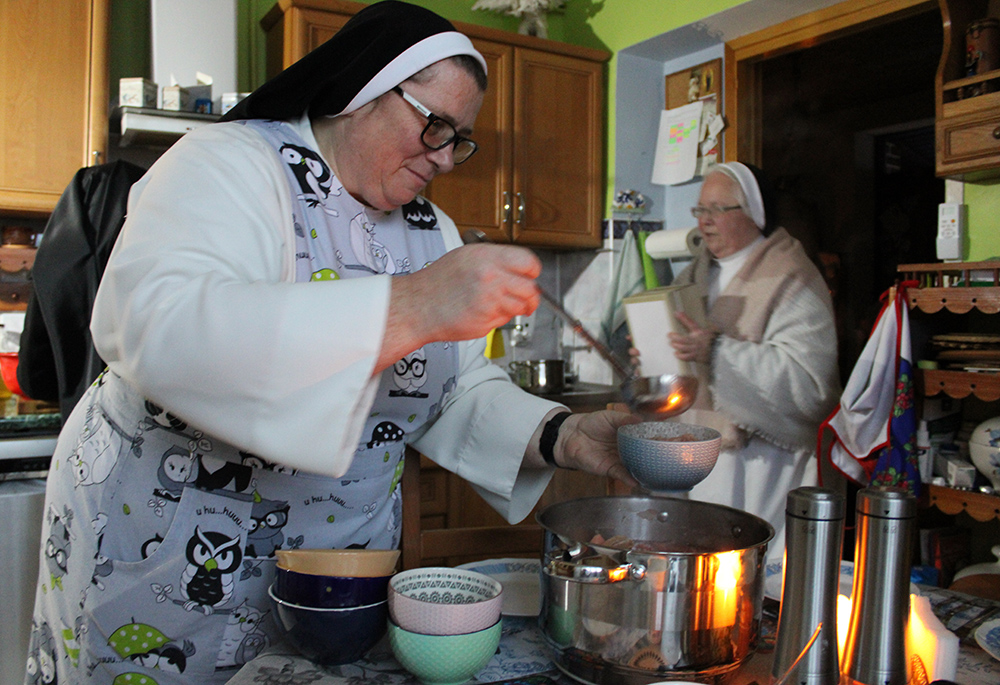
Sr. Mateusza Trynda, the local superior of the Dominican convent and a resident of Zhovkva, Ukraine, for 28 years, serves soup for guests during a midday candlelit meal Nov. 24. (GSR photo/Chris Herlinger)
"Advent begins Sunday," Sr. Margaret Lekan told me shortly before we crossed the Poland-Ukraine border on Nov. 24. "We're on a mission for light."
The Polish Dominican sister smiled as she evoked the spirit of Advent and lights, but she also meant it literally: The cargo area of her congregation's brown Skoda Fabia hatchback was filled with dozens of boxes of flashlights and candles, bought while still in Poland and destined for a Dominican convent in Zhovkva, Ukraine. Since the Feb. 24 start of the Russian-led war, that convent has been transformed into an all-purpose sister-run humanitarian distribution center.
The need for flashlights and candles has taken on real urgency with increased electrical blackouts in Ukraine; the recent torrent of Russian bombardments has strained the country's power grid. The need for light is keenly felt as short days and long nights descend on a country that must also contend now with winter's bracingly cold temperatures.
"The situation is just very, very difficult right now," Lekan said as we came close to the border crossing at Budomezh-Hrushiv, foggy skies enveloping the snow-covered flatlands with an unwelcome cast of gray.
Lekan had invited me only two days earlier to join her and volunteer Malgorzata Porebska on a two-day mission to meet four Polish Dominican sisters living and working in Zhovkva and to get some idea of conditions in a city far from the front lines but still affected by war.
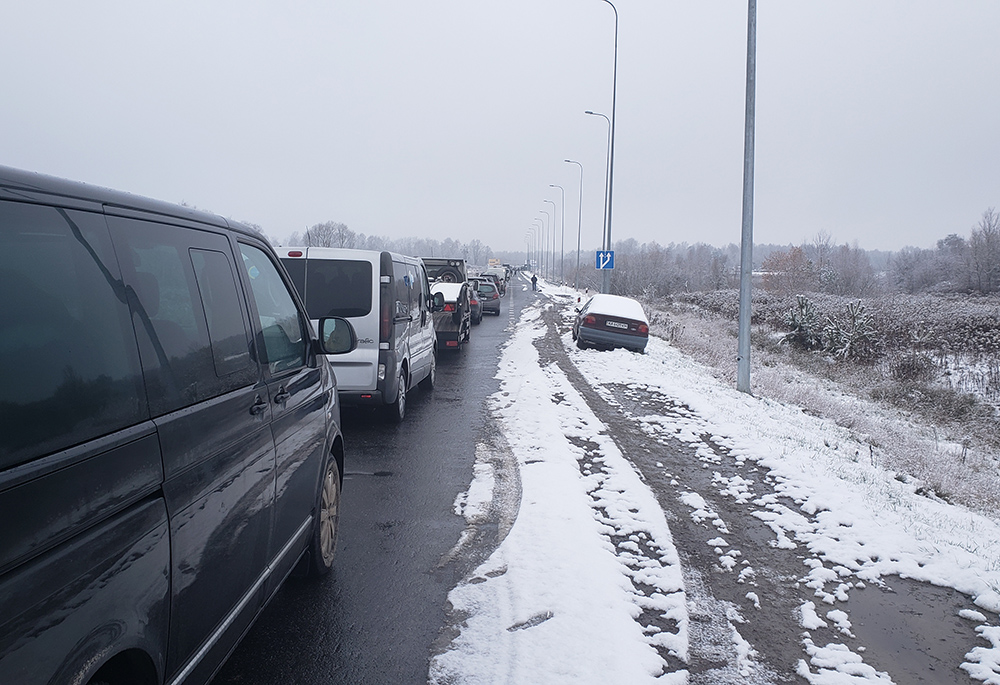
A return from Zhovkva, Ukraine, to Poland on Nov. 25 required about 12 hours of travel, seven of them stuck in a slow-moving line at this border crossing. It is next to impossible to predict the pace of border crossings, especially back to Poland. (GSR photo/Chris Herlinger)
Our day began at 5:30 in the morning with stops to buy candles, flashlights and fresh bread — "a taste of home" for our hosts, said Lekan, 46. She studied and worked in the United States for nine years, from 2000 to 2004 and 2005 to 2010, and her current ministry in Krakow focuses on vocations and preaching and evangelization, particularly to women.
It took about six hours of travel from Krakow across southeastern Poland, including an hour at the border crossing, to arrive in Zhovkva, a city of about 14,000 in western Ukraine and a center for a surrounding agricultural district. (Our return to Poland was not as easy. It required about 12 hours of travel, seven of them stuck in a slow-moving line at another border crossing. It is next to impossible to predict the pace of border crossings, especially back to Poland.)
Along the way, Lekan and Porebska alternated as drivers, and during our travels, Lekan prayed the rosary, reciting in English with the help from an app on her phone. As we continued our journey and made progress — for example, as we crossed the border — she would quietly say, "Thank you, Jesus."
Upon our arrival at the sisters' convent, a comfortable but crowded two-story residence located on an unpaved side street in Zhovkva, our hosts greeted us effusively and apologized for any discomfort or inconvenience we might experience.
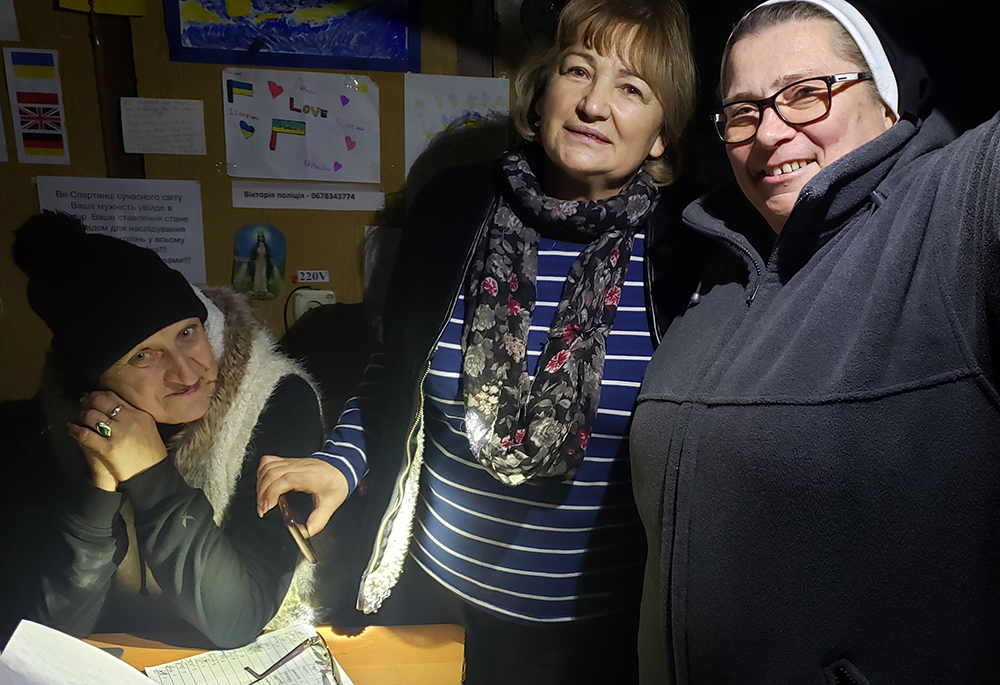
Dominican Sr. Mateusza Trynda, right, with volunteers at a darkened humanitarian center in Zhovkva, Ukraine, lit only by flashlights given electrical challenges. (GSR photo/Chris Herlinger)
Though blackouts had been intermittent, this was the first full day without electricity, said Sr. Mateusza Trynda, the local superior of the house and a resident of Zhovkva for 28 years.
"We just have to deal with things as they are," she said with a shrug, welcoming us to table for a midday candlelit meal of pierogis, borscht and stewed apricots.
The sisters said they have a backup generator for heating, which makes them luckier than others. But they also noted the inherent challenges and dangers of life without electricity — for example, the uncertainty faced by dialysis patients.
"It can be a life-or-death situation for some," Trynda said.
The sisters also noted the abundant ironies of life now.
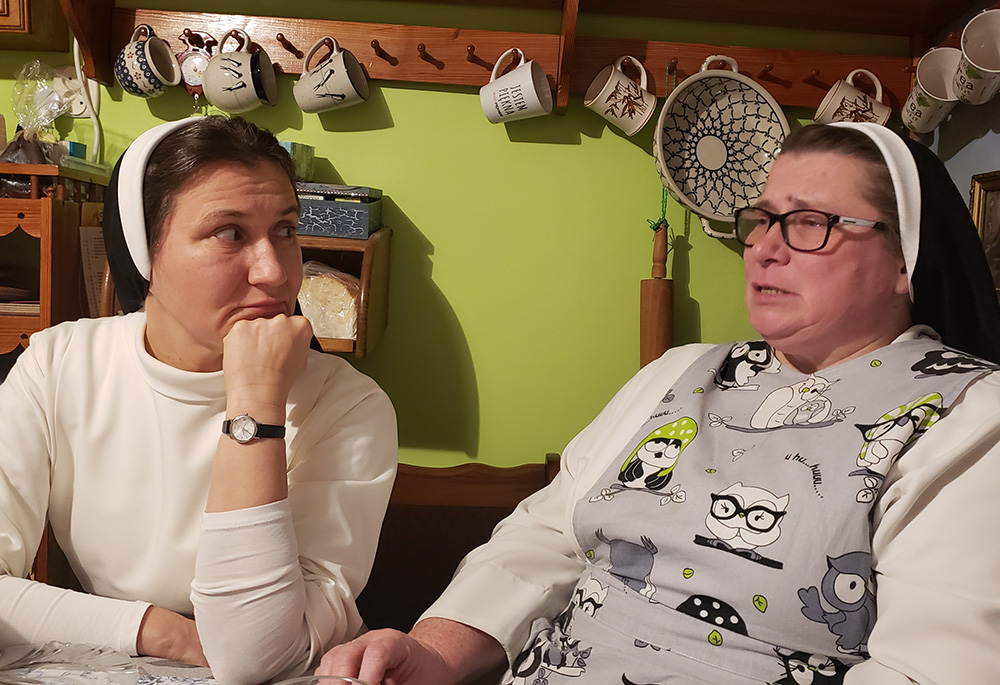
Polish Dominican Srs. Margaret Lekan, left, and Mateusza Trynda, the local superior of a convent of four Polish sisters in Zhovkva, Ukraine, during a meal at the convent (GSR photo/Chris Herlinger)
"The Russians have brought families together over candlelight to read old stories like fairy tales," said Sr. Juwencja Dziedzic, who has been in Zhovkva for 19 years.
Zhovkva is about 25 miles from a military base that Russian missiles bombarded in March. Though the city itself has not yet been a Russian target, residents have seen or heard bombs fly over the town, said Sr. Sarah Lakoma. Alarms are common, with as many as four a day, Lakoma added, though during the two days I was in Zhovkva, I didn't hear any.
"When we do hear the alarms, we will pray but just continue what we're doing," she said. She and others repeated this theme during my visit, noting that it is a necessary way of coping. Otherwise, she said, "you just become overcome with fear and tension."
Amid such challenges, there is work to do. The distribution of candles and flashlights began the next day after the arrival of a humanitarian convoy of three vans of food and medicine from Caritas shepherded by a group of Polish priests.
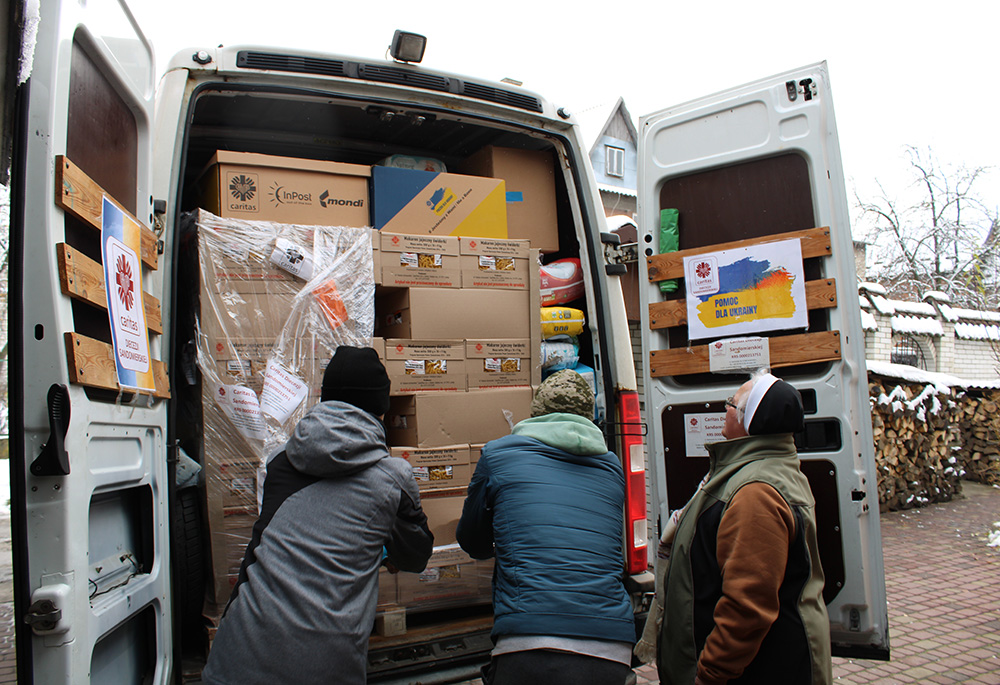
Volunteers help unload a delivery of humanitarian items to a Dominican convent in Zhovkva, Ukraine, provided by Caritas Poland and delivered by three Polish priests. (GSR photo/Chris Herlinger)
The small candles — Lekan brought 30 boxes in all, enough for about 460 families for about four days — were a particular godsend, as they are scarce and costly. They reportedly cost more than a loaf of bread, and bread is not cheap in Ukraine right now.
The sisters are proud that their convent is a community resource, one of the few places in town offering assistance people can count on. But they stress that they do what they do only in partnership with others, including Caritas. Other Dominican sisters, U.S.-based Sisters Rising Worldwide, World Central Kitchen, the Polish Red Cross and others also have provided material aid or cash assistance to the sisters.
There is at least one other major resource in Zhovkva: a humanitarian center housed at a civic theater in the center of town. Lekan and Trynda accompanied me there in the late-afternoon dying sunlight as the faint trace of wood-burning fires filled the city air. We needed flashlights to make our way through the complex, ending up in a large side room filled with used clothing that had been sorted neatly.
The first thing volunteer Natalia Szymkowicz, a librarian, told me about the sisters when we arrived is that residents respect and value the sisters as real community leaders, which is appreciated now more than ever.
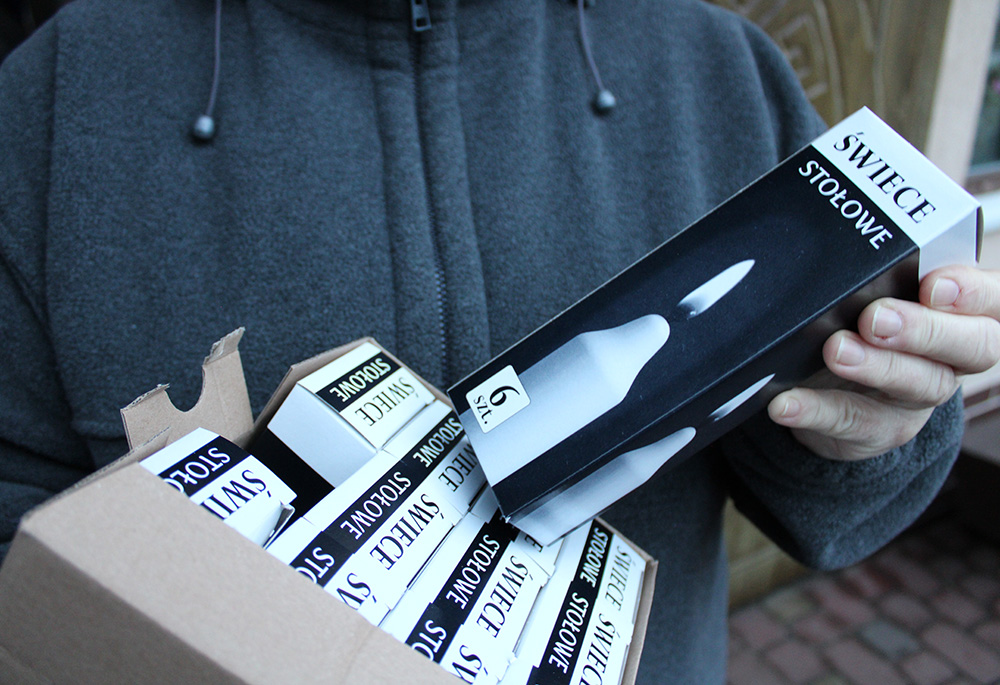
The need for candles has taken on urgency with increased electrical blackouts in Ukraine after a recent torrent of Russian bombardments strained the country's power grid. These candles, brought from Poland, were distributed to residents of Zhovkva, Ukraine, at a Dominican convent. (GSR photo/Chris Herlinger)
"We always thank the sisters for their work," she said. "There are only four nuns assisting in this entire city. They are like our bright suns."
The sisters' work before the war — whether as teachers or in providing food or medicines to those in need — has made a quiet but permanent mark, Szymkowicz said, noting that Zhovkva is not a prosperous place. When the sisters arrived in Zhovkva in the mid-1990s following the collapse of the Soviet Union, they reportedly owned only the second car in the town.
Zhovkva resident Liana Blikharska, 24, who works with the sisters on humanitarian efforts, said their community-based work is nothing new: "They coordinated the work of volunteers for years."
"We've been networking and building relationships with people in the community well before the war," said Trynda, who believes a new sense has developed in Ukraine since the 1990s of becoming closer to Europe than Russia.
"They have a quality of a free person now," she said. "The Soviet person couldn't think on their own. They wouldn't take responsibility for their actions."
Advertisement
Numbers of those arriving has declined since the immediate onslaught at the start of the war. Hundreds of families arrived at first, many stopping for a day or two before heading to Poland. Now, there are perhaps only about a dozen families arriving daily.
That could change, however, if the winter in an electricity-deprived Ukraine proves unbearable in the coming months.
Despite the hardships, the volunteers are doing their best to help not only with material assistance but with maintaining cultural life. With informal concerts, plays, poetry readings and embroidery classes — all by candlelight, if needed — the city is trying to keep residents engaged.
"It's very important to keep culture going," said volunteer Kateryna Plechii, the daughter of another volunteer, Hala Lozij, who works alongside Szymkowicz in registering new arrivals to the city. "We are fighting the war by building culture."
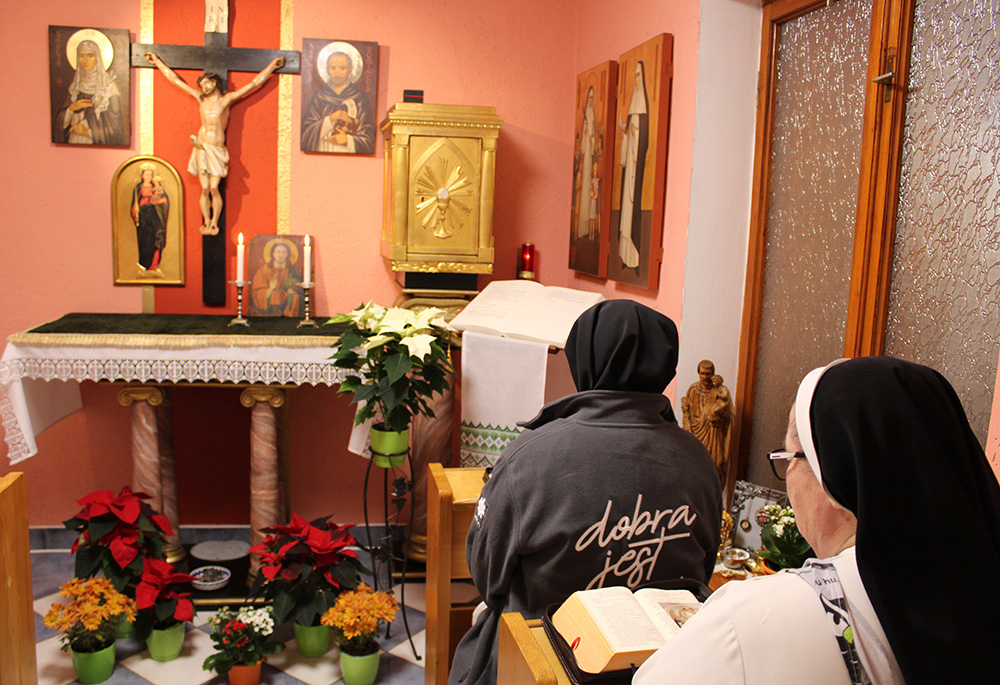
Prayers during Mass at the convent of four Polish sisters in Zhovkva, Ukraine (GSR photo/Chris Herlinger)
However, the reality of war itself is never far away. The auditorium of the building housing the humanitarian center is now a vast storage area for medical supplies going to the war's front lines.
After three hesitant flickers of light, the electricity came back on, and it was possible to see that many of the seats of the auditorium had been taken out, the area groaning with boxes of medicine, bandages and other supplies, like crutches.
"We have a strange new life now," said welder and medical coordinator Vadym Voronin. "But, as you can see, we have a lot of friends in Poland, in the United States."
Voronin, who works at the nearby Yavoriv military base, coordinates the distribution of medical supplies through the volunteer group ICare Ministry but has also worked with the sisters as they provide medical supplies.
Trynda stood next to Voronin and smiled as he said that this "strange new life" of Ukrainians is a necessity.
"It's our country. We must protect our way of life," Voronin said.
Welder and medical coordinator Vadym Voronin, right, with Dominican Sr. Mateusza Trynda at a humanitarian center in Zhovkva, Ukraine. Voronin, who works at the nearby Yavoriv military base, coordinates the distribution of medical supplies through the volunteer group ICare Ministry but has also worked with the sisters as they provide medical supplies. (GSR photo/Chris Herlinger)
I asked Voronin why analysts believe Russia is losing the war. He said in contrast to a war-aroused and united Ukraine, Russian soldiers "don't have the motivation. They've been surprised by how fiercely Ukrainians are fighting for our country, and they've also been surprised by the international support."
Ukrainian spirits are being boosted by the many social media apps that allow civilians to keep in touch and track war developments. One such app allows users to see where a launched Russian missile might be headed.
"We have a new age of war," Voronin said.
Even so, Blikharska, who works with ICare as well as the sisters, said later in the day that not everything can be determined with an app or new technology.
"You can't schedule a day. Everything changes every day. We're getting used to the new circumstances," she said.
That's a kind of "everyday protest" against Russian President Vladmir Putin and Russian forces, she said. "Once the alarms finish, people go back to their normal lives." In other words, normality becomes an act of resistance.
Later that evening, over a simple dinner of cheese, sausages and bread, the sisters and visitors shared cellphone photos of celebratory events.
"War or no war, birthdays continue," Lakoma said.
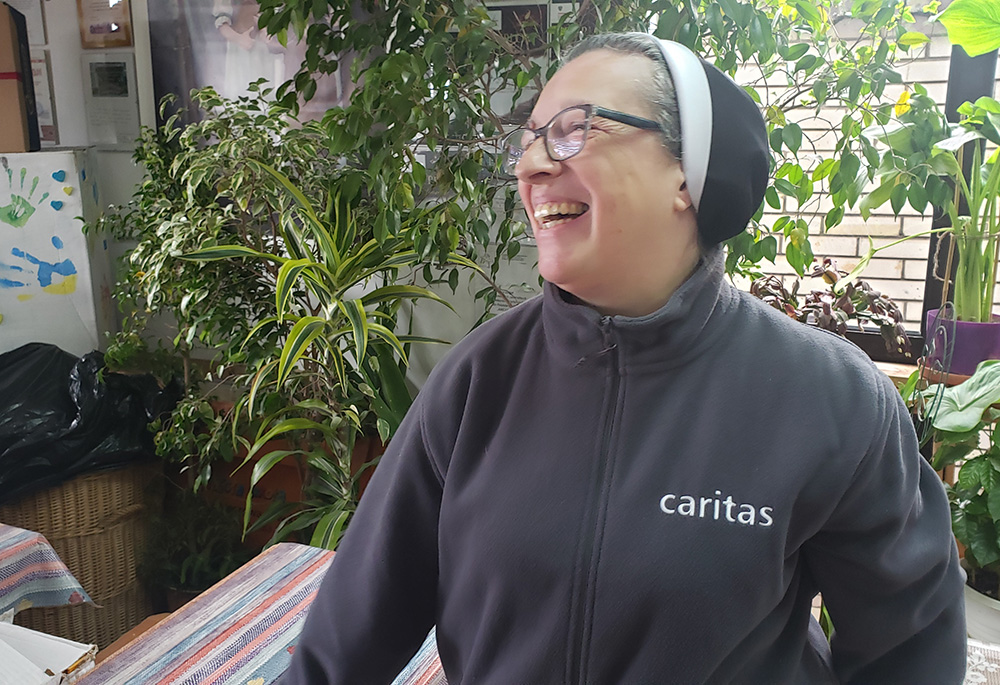
Despite the challenges of limited space and time at the convent at Zhovkva, Ukraine, Sr. Sarah Lakoma beamed when she spoke of her students and her calling as a teacher. "Even with everything, we're happy here," she said. "I've accepted that this is the place where God wants me to be." (GSR photo/Chris Herlinger)
I asked Blikharska when the worries over bombs and alarms are most frequent.
"They love Monday mornings," she said to laughter from the sisters. "And Saturdays."
The laughter died down as one sister recalled the many stories making the rounds these days, like that of a mother who left her children for a few days without telling them she was going east to bury their soldier-father.
Blikharska believes the war is transforming national life. People in eastern Ukraine, who often grew up speaking Russian as a first language, are now embracing a distinct Ukrainian identity, she said. "People are united."
I pursued that theme further the next day, but not before Lakoma showed me the classroom where she teaches Polish and religion to students ages 7 to 17. (Zhovkva, like the nearby Lviv, was once Polish, and familial and social ties to Poland are close. Parents also believe learning Polish may help "open up work possibilities," Lakoma said.)
Up to 30 students fit in the small space where she teaches Saturday classes — down from twice-a-week classes before the war. Despite the challenges of limited space and time, Lakoma beamed when she spoke of her students and her calling as a teacher.
"Even with everything, we're happy here," she said. "I've accepted that this is the place where God wants me to be."
The acceptance of a call in the midst of war is not always easy, however.
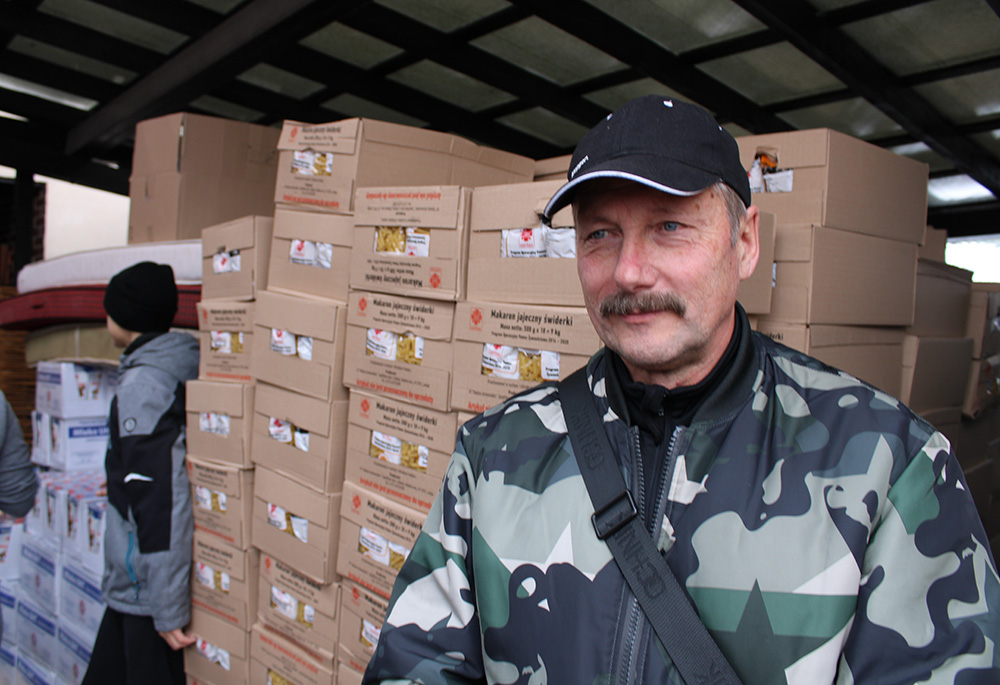
Kostiantyn Sklifus, 63, a career military man first with the Soviet army — where he served in Afghanistan and Chechnya, among other locales — and later with Ukrainian forces, now volunteers with Caritas. He believes many Ukrainians' firsthand experiences as onetime Soviet citizens is a reason people are committed to an independent Ukraine. (GSR photo/Chris Herlinger)
Kostiantyn Sklifus, 63, doesn't carry the burden of war lightly. A career military man first with the Soviet army — where he served in Afghanistan and Chechnya, among other locales — and later with Ukrainian forces, he now volunteers with Caritas and helped in the three visiting Catholic priests' delivery of goods from Poland to Zhovkva.
After morning Mass with the sisters and the visiting priests, Sklifus reflected on the war and the undercurrents of Ukrainian nationalism.
"There's too strong a Ukrainian identity" for the Russians to win the war, he believes, and that stems in part from the 2004-2005 Orange Revolution and later protests in 2013 in which Ukrainians rejected pro-Russian rule.
Sklifus and his family traveled to the capital of Kyiv and participated in the 2013 street protests — a seminal event for them and thousands of others.
His own identity as Ukrainian stems from those events as well as disillusionment with Russian culture and politics and even with the Russian Orthodox Church — he is a Catholic convert.
"It's a corrupted place," Sklifus said of Russia. "Everything is upside-down."
He believes many Ukrainians' firsthand experience as onetime Soviet citizens is a reason people are committed to an independent Ukraine.
"What we're fighting for is a better society," he said, framing the war as a clash of civilizations.
I witnessed that deep love of country with others, too. Andrij Nevyniak, 38, a local construction worker, is the father of five children ages 6 to 16, which allows him to remain with his family in Zhovkva and not be drafted into the Ukrainian armed forces. (Fathers with three or more children are exempt from conscription.)
While the family could have left for Poland, they made a "categorical decision" to stay in Zhovkva.
"I was born here, I live here," he said. "This is my homeland."
When they can, the family volunteers with the Dominican sisters' humanitarian efforts.
"We're always available to help the sisters," Nevyniak said, which on this day meant unloading pallets of canned food. "The sisters are like godmothers to us. We'll do whatever is needed."
In the early afternoon, as we were leaving, Zhovkva residents began to line up for the candles we had brought with us the day before. Though patient and orderly, they looked anxious, tired and wan. I didn't have the heart to ask them any questions.
But as we got into Lekan's car, I asked Trynda a final question: "What sustains you?"
"Faith," she said, outstretching her arms. "Faith. Otherwise, I couldn't stay here."







